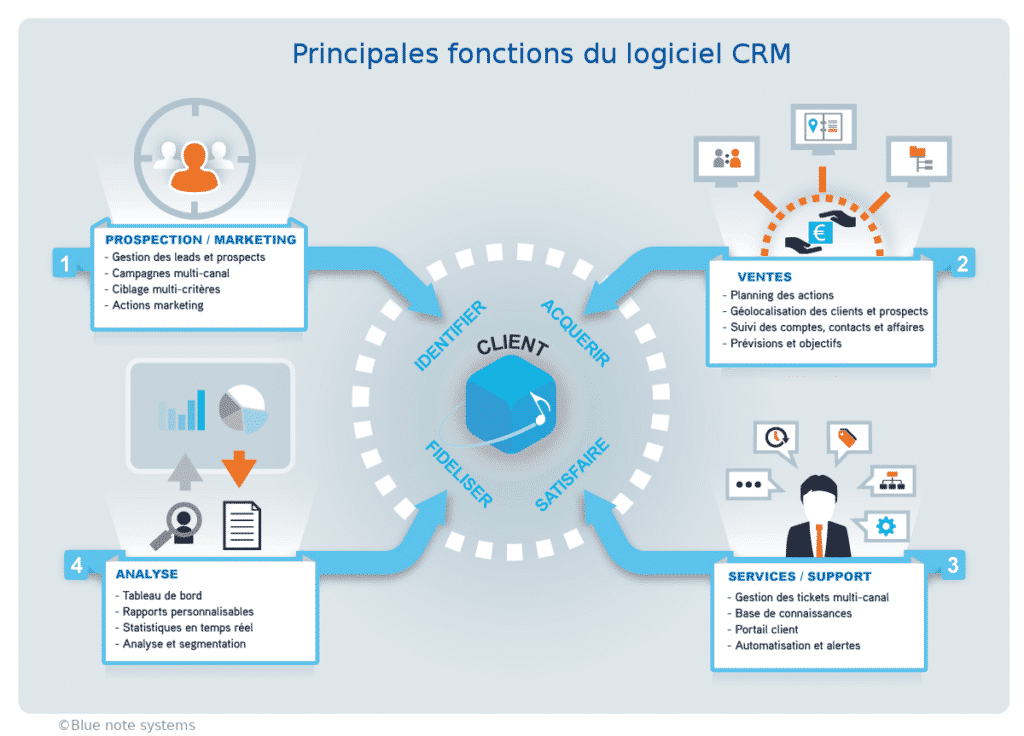The CRM means Customer Relationship Management in English or Gestion de la Relation Client (GRC) in french. It is a strategy by which the company aims to understand, anticipate and manage the needs of its current and potential customers.
CRM tools have long been reserved for large companies, due to their cost or their difficulty of implementation. This is no longer the case today, with dedicated solutions that are easy to use. A CRM platform will be responsible for collecting and organizing the information and interactions of your company with your customers, your leads or other business contacts. There are many advantages of CRM:
- communicate more interestingly and ultimately with prospects and customers,
- better understand customers,
- improve productivity and profitability.
CRM, or customer relationship management, is a strategy and set of tools that businesses use to manage their interactions with customers and clients. CRM systems typically include features for managing contacts, sales, marketing, and customer service. They can also include analytics and reporting capabilities to help businesses gain insights into customer behavior and preferences.
The adoption of CRM has grown significantly in recent years, as more and more companies are realizing the importance of understanding and managing their customer relationships. With the rise of digital technology, many businesses are turning to digital CRM solutions to help them manage customer interactions and data more effectively.
Digital transformation is the integration of digital technology into all areas of a business, fundamentally changing how it operates and delivers value to customers. CRM is often a key component of digital transformation, as it enables businesses to automate and streamline customer-facing processes, gain insights into customer behavior, and improve communication and engagement with customers.
Why use a CRM platform ?
Good data organization :
A CRM allows you to have an overview of all customers, centrally and securely.
More efficiency :
Storing information on different files is the best way to lose leads and business opportunities. With a CRM, all employees have access to the customer database and can enrich it with data. A unified system is the only way to get an overview and detail of your Commercial panel.
Analysis of customer data :
A CRM allows marketing teams to set up lead generation campaigns, and to qualify leads. Once qualified, they can be sent to the sales department. The CRM allows you to adapt your commercial message according to the type of leads for more efficiency.
Better communication :
A CRM will also allow you to improve your communication. It allows you to integrate with your tools and process for sending emails, including models and monitoring scenarios. CRM also integrates with Social Media platforms, such as Twitter, Facebook or LinkedIn, to have a complete view of your clients’ issues.
Competitive advantage :
Above all, a CRM is an essential tool for analyzing your performance. You have the opportunity to see what is working, or what is not, and to tailor your sales pitch based on the data available.
What solutions for SMEs :
Several CRM solutions are available on the market. Before making your choice, it is important to consider several important criteria:
Integration of the platform :
A CRM must imperatively be able to adapt to the tools you already use. This integration allows you to personalize your marketing campaigns, reach more customers with detailed information, offer personalized shopping experiences and meet the needs of your customers.
Scalability :
A CRM solution sometimes seen as too complex or too expensive. However, the solution consists of several features and plans adapted to all sizes of business, it is not reserved for large groups. The more your needs increase, the more you can switch to advanced functionalities.
Customer Support :
When choosing a CRM, it is important to consider the capabilities of the solution to take into account the needs of the client. Efficient and personalized deployment requires responsive customer support.
Cloud-based CRM :
A cloud-based CRM allows data to be accessed anywhere, anytime. Updates are done in real time, and leads can be added immediately, even on the go. For an SME, this is also an advantage in terms of cost and maintenance.
To learn more, download the full white paper on the benefits of CRM at this link.



Very interesting as information thank youery interesting as information.Thank you
Thank you so much brother. I’ll work all the time for you